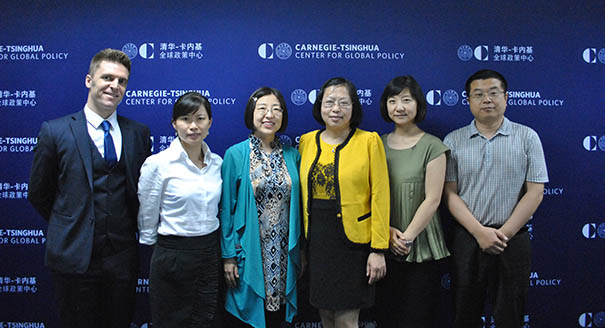Registration
You will receive an email confirming your registration.
The Impact of Cultural Differences on Chinese Commercial Activity in Europe
In a series of speeches made in the fall of 2013, Chinese President Xi Jinping unveiled his Belt and Road Initiative (BRI) to promote infrastructure development and create trade routes linking China and Europe. Chinese companies investing and operating abroad are largely driving the initiative, which has received a lukewarm response in several countries. While this reaction has been attributed to a number of factors, cultural differences play an important role in the BRI, particularly in Chinese investments and companies entering European markets.
Carnegie–Tsinghua Center scholar Zhang Lihua moderated a discussion with a panel of Chinese and foreign experts, focusing on Chinese companies’ navigation of cultural differences in the European market. Panelists explored how policymakers and business leaders can build more constructive and fruitful relationships in light of these differences. This discussion was off the record.
Discussion Highlights
- Cultural Differences Between China and the West: Panelists agreed that Chinese and Western cultures show a high level of dissimilarity due to vastly different historical backgrounds. These differences, one panelist said, are most visibly seen in approaches toward power and authority. In most Western societies, the panelist continued, government is seen as a means to serve the interests of the people, and checks and balances are put in place as a natural result of the people’s mandate. In China, however, a leader’s power originates from their perceived virtue, which the panelist argued means that in China, a higher degree of government intervention is not a cause for alarm because the people should be able to trust their government.
- Impact of Cultural Differences on Commercial Activity: Panelists explained that many European countries are worried about the high degree of governmental involvement in financial ventures, notably through Chinese state-owned enterprises and within the context of the Belt and Road Initiative. One panelist linked this level of mistrust to an innate disposition in Western societies to minimize governmental intervention whenever possible. One panelist cited as an example a project to build a new power station at Hinkley Point in the United Kingdom, which was halted when Prime Minister Theresa May came to power. This project only received the UK leadership’s go-ahead after the G20 in Hangzhou, during which President Xi and May were able to meet personally and clear any misunderstandings about China’s geopolitical ambitions.
- The Role of Mainstream Media: One panelist observed that media depictions of China in the West have generally displayed negative sentiments, which, the panelist added, was likely also due to cultural differences. Western media acts as a watchdog for the government’s policies and actions, hence when news comes out, it is usually considered bad news, the panelist explained. As such, the panelist concluded, Chinese policymakers should refrain from overreacting to each news article that depicts China in a negative light. Instead, China should remember that Western media is monopolized by private enterprises with little or no governmental affiliations, and consequently should not let its policies depend entirely on media reports.
- Emphasizing Commonalities: Looking forward, all discussants suggested that policymakers should keep these differences in mind while emphasizing commonalities in Chinese and Western cultures. Commonalities, panelists argued, should be the basis of international cooperation. Citing the example of the 2015 United Nations Climate Change Conference in Paris, one panelist argued that addressing national cultural differences while focusing on common interests offers many opportunities for cooperation on broader issues, such as poverty, pollution, and climate change. The panelist added that the idea of common but differentiated responsibility, which emerged in the Paris Agreement, is a positive framework that emphasizes commonalities without trying to impose a one-size-fits-all solution to global issues.
- Improving Cross-Cultural Communication: In order to find areas of cultural convergence and commonality, panelists agreed that cross-cultural communication between China and Western countries needs to be improved. As such, another panelist emphasized the importance of learning from each other instead of making unilateral decisions. Equally, one panelist said that China should learn to state its interests and goals more clearly in order to clear any misunderstandings and suspicions that stem from a lack of information. In general, the panelists concluded, awareness of cultural differences should be used in an active effort toward more effective cooperation.
Xing Yue
Xing Yue is an associate professor at the Department of International Relations at Tsinghua University and the director of the Center for Chinese Foreign Policy.
Zhang Li
Zhang Li is an associate professor in the School of Journalism and Communication at Tsinghua University.
Liu Zuokui
Liu Zuokui is the director of the Department of Central and Eastern European Studies of the Chinese Academy of Social Sciences.
Jarrett T. Wilde
Jarrett T. Wilde is a Canadian PhD candidate at Tsinghua University focusing on how China cooperates with Western societies.
Chen Heng
Chen Heng is the deputy director of government affairs for Huawei Technology’s Beijing office.
Zhang Lihua
Zhang Lihua is a resident scholar at the Carnegie-Tsinghua Center for Global Policy where her program at the center examines how China’s core values affect Chinese foreign policies. Zhang is also the director of European Studies Center at the Institute of International Studies at Tsinghua University.
